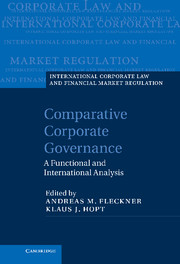Book contents
- Frontmatter
- Contents
- Contributors
- Preface
- Abbreviations
- Part I General report
- Part II National reports
- A Australia and Asia
- B Europe
- 6 Austria
- 7 Belgium
- 8 Denmark
- 9 Finland
- 10 France
- 11 Georgia
- 12 Germany
- 13 Hungary
- 14 Luxembourg
- 15 Netherlands
- 16 Norway
- 17 Poland
- 18 Portugal
- 19 Spain
- 20 Switzerland
- 21 United Kingdom
- C The Americas
- Part III Annex: Questionnaire
- Index
- References
17 - Poland
Corporate governance of joint-stock companies
from B - Europe
Published online by Cambridge University Press: 05 July 2013
- Frontmatter
- Contents
- Contributors
- Preface
- Abbreviations
- Part I General report
- Part II National reports
- A Australia and Asia
- B Europe
- 6 Austria
- 7 Belgium
- 8 Denmark
- 9 Finland
- 10 France
- 11 Georgia
- 12 Germany
- 13 Hungary
- 14 Luxembourg
- 15 Netherlands
- 16 Norway
- 17 Poland
- 18 Portugal
- 19 Spain
- 20 Switzerland
- 21 United Kingdom
- C The Americas
- Part III Annex: Questionnaire
- Index
- References
Summary
General information on corporate governance
Definition of corporate governance
There is no legal definition of the term “corporate governance” in Polish law. The expression is borrowed from the Anglo-American literature and is usually defined as a system of institutions and rules that govern competencies of company organs. Both in legal and non-legal parlance, the term is mainly used with respect to public companies (i.e., companies whose shares are traded on the stock exchange). Some authors use the term corporate governance in the narrow sense, namely, covering only soft rules adopted by public companies and by the Warsaw Stock Exchange by way of self-regulation. This body of soft rules is frequently described as “best practices.” In this chapter, corporate governance is used in a broad sense to cover both statutory and soft rules, including external corporate governance norms beyond the strict remit of company law regulating competencies of company organs, including, for instance, accounting and auditing rules shaping rights and duties of company organs, in particular those applicable to the management board and supervisory board.
Statutory regulation of stock companies (corporations)
The Code of Commercial Companies of 2000 (“CCC”) constitutes a comprehensive regulation of capital companies and partnerships, including their restructurings (i.e., mergers, split-offs, and transformations). Stock corporations (spółki akcyjne) are comprehensively regulated in the CCC, which distinguishes between public and private companies. The majority of the CCC rules apply to both forms of corporations, but there is a growing number of special rules that apply only to public companies. Sometimes, especially in the process of implementing EU Directives that govern public companies, the Polish Parliament extends European rules to private companies (i.e., companies whose shares are not traded on stock exchanges).
- Type
- Chapter
- Information
- Comparative Corporate GovernanceA Functional and International Analysis, pp. 753 - 787Publisher: Cambridge University PressPrint publication year: 2013



